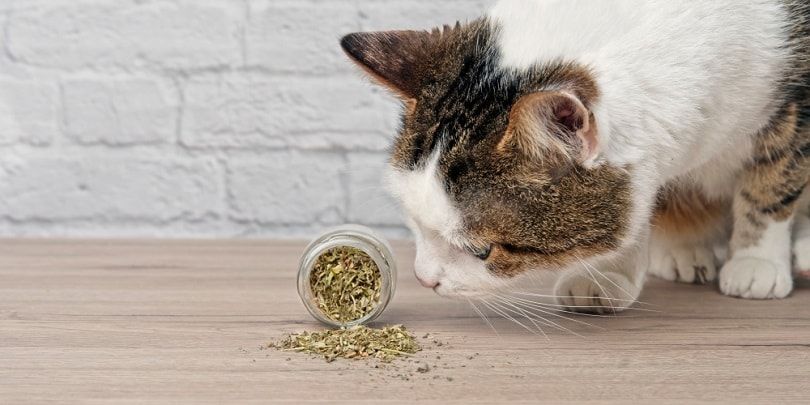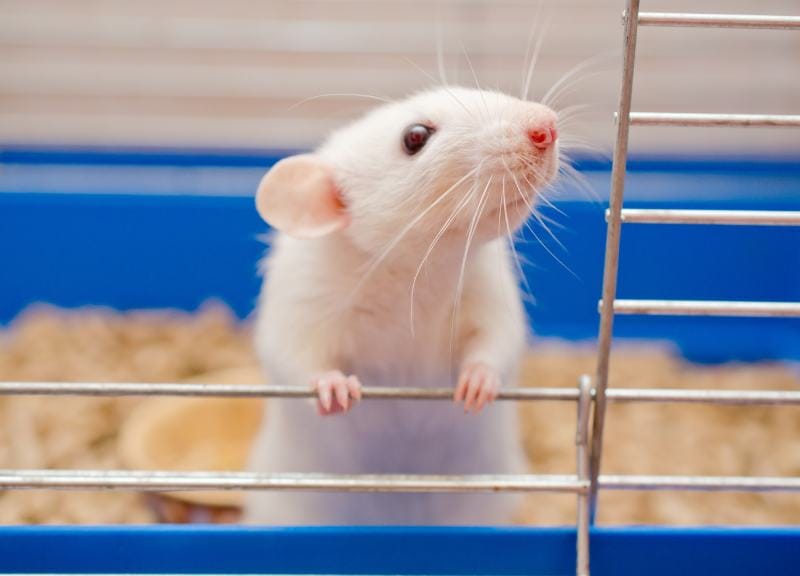VET APPROVED

The information is current and up-to-date in accordance with the latest veterinarian research.
Learn more »Click to Skip Ahead
Catnip, sometimes also called catwort or catmint, is an herb well known—and often well appreciated—by cats and cat lovers. Just as its looks would suggest, catnip is a close relative to plants in the mint family. While it has relaxing and sedative properties when given to people, its intense effects are perhaps the most obvious in our feline friends. This often leads pet parents to wonder whether kittens can have catnip. How old should a cat be before they can be exposed to it?
Catnip is generally safe to give cats of all ages, though very young kittens may not react to it. Do not give catnip to kittens with seizures or other neurological conditions.

How Does Catnip Work?
The active ingredient in catnip is nepetalactone, which acts as an insect repellant for the plant. When nepetalactone comes into contact with the smell receptors inside a cat’s nose, they cause an endorphin release, with effects quite similar to those of morphine. Studies suggest that these effects are most noticeable in about two-thirds of cats, with another third seemingly less or not sensitive.1 This is probably genetic and hereditary. Kittens under the age of 3 months tend to not show much response either.
The effects of nepetalactone usually begin quickly and last for between 5 and 15 minutes. After this, cats develop tolerance and are no longer sensitive for at least a few hours. This said, catnip is non-addictive and does not seem to create dependency.
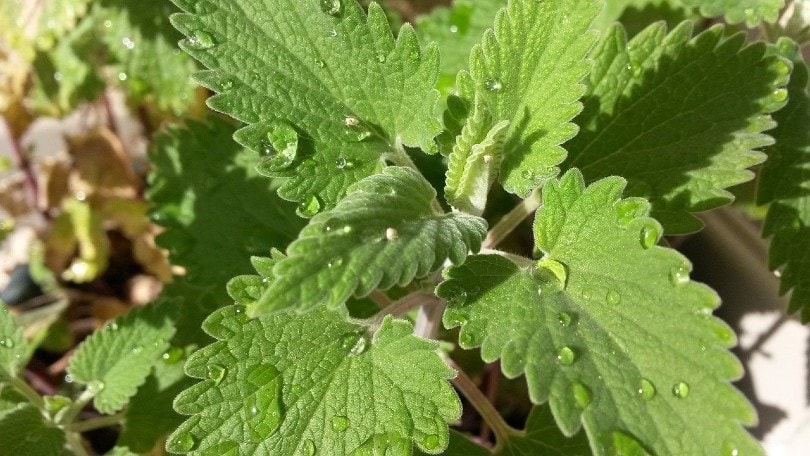
How Do Cats React to Catnip?
Cats sensitive to catnip will usually start sniffing, rolling, licking, chewing, and rubbing their cheeks. Just like opioid drugs, its effects tend to remove inhibitions, and this can manifest in different ways depending on the cat’s personality and behavioral tendencies.
In some cats, the effects of catnip can be more calming, and they might start drooling, purring, and becoming very relaxed and sleepy. In contrast, other cats can become more heightened, playful, vocalizing, and leaping around. In some cases, it can cause certain cats to display anxious or even aggressive behavior, which is a much less desirable effect.
What Are Some of the Different Uses of Catnip?
For cats that seem to enjoy the effects of catnip (remember, not all will!), pet parents report using the herb in the following situations:
- It provides occasional sensory enrichment and enhanced play.
- It’s used for positive reinforcement, especially to encourage a cat to use a new scratching post or bed.
- In some instances, it can reduce anxiety when traveling, settling into a different environment, or becoming familiar with their cat carrier. This will very much depend on the cat’s response, however, as some cats tend to become more wired and anxious, which would be counterproductive here.
Remember, it is best to see how your cat or kitten responds to a small amount of catnip first, before considering using it for other purposes.

Can Kittens Have Catnip?
Medical Considerations
Medically speaking, catnip is a safe and harmless herb for cats, including kittens, though very young kittens will likely not show any behavioral response to it. It is safe to be eaten in small quantities, and even if a cat goes overboard, this will generally only cause a bit of vomiting and diarrhea.
However, it is best not to give catnip to kittens (or any cat, for that matter) with a neurological condition, specifically seizures. It is also probably best to avoid giving it to a group of several kittens at once or if a young child is around, as it can heighten aggressive or anxious behavior in some cats.
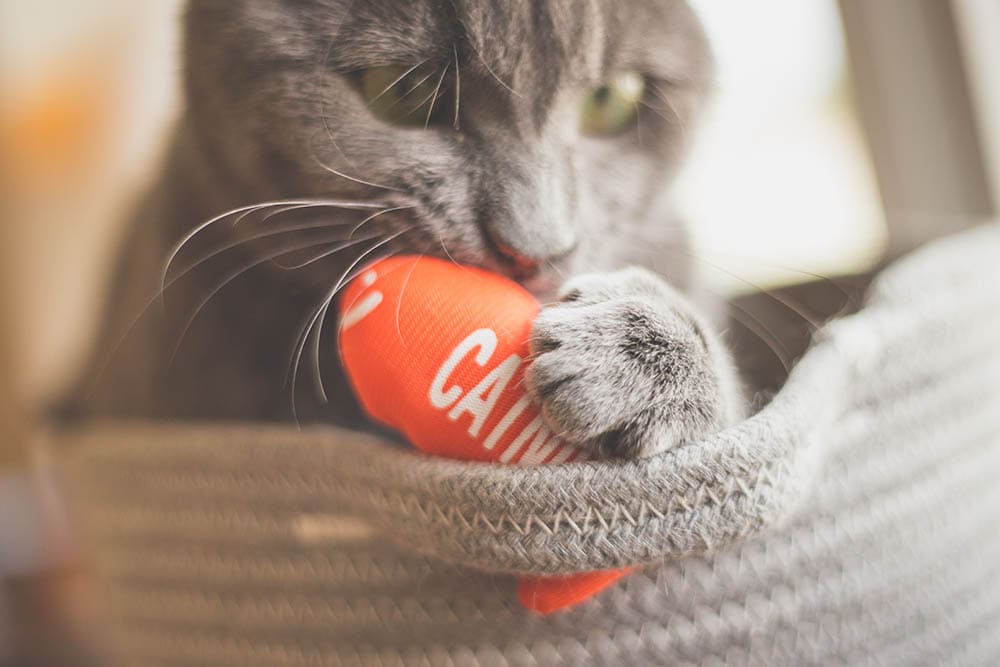
Ethical Considerations
Ethically speaking, most owners find the effects of catnip to be quite positive for their cats. They might also use catnip to enhance play and bonding with their kittens. These pet parents feel that their cats find the experience quite enjoyable and therefore, do not see any ethical issues in utilizing it as an occasional treat.
That said, a few people have voiced the opinion that giving a mood-altering substance to a pet should raise ethical questions. There appears to be no clear consensus on this, so we would suggest that with a clear understanding of how catnip works, pet parents can weigh both aspects of this debate and decide in an educated manner whether they are morally comfortable giving it to their kitten.
How Can I Give Catnip to My Kitten?
Different forms of catnip can be used with kittens. Remember, a little goes a long way!
- Dried catnip can be sprinkled on surfaces, bedding, and scratching devices.
- Catnip toys are also popular. You might want to go for the kind that you can refill so they keep their appeal over time.
- Catnip mats are alternatives to toys.
- Fresh catnip, which looks a lot like mint, can be grown and harvested at home. Some would argue that this is the most natural and least concentrated form of catnip.
- Catnip spray is usually the most concentrated form of delivering nepetalactone.
Catnip can really enrich your cat's life, especially if you choose a fun, well-built catnip toy. Our favorite option is Hepper's Catnip Stick Toy, which offers sturdy construction, 100% organic catnip fill, and a great range of colors. These toys are handmade in the USA and feature bite-proof double bagging.
At PangoVet, we've admired Hepper for many years, and decided to take a controlling ownership interest so that we could benefit from the outstanding designs of this cool cat company!
When Should I Avoid Using Catnip?
Although it is considered safe and harmless in most situations, catnip can be a significant stimulant for some cats, so it is best to avoid using it on those with a history of seizures or other pronounced neurological problems.
Catnip indulgence can also prove to be an issue for cats that might be prone to being aggressive or tend to be bullies in a group of other felines. For this reason, it is best to also be careful when using it for the first few times when children are around.
Out of an abundance of caution, catnip should also be avoided in pregnant cats, as it has been reported to potentially induce uterine contractions.
What If My Kitten Does Not Seem to Respond to Catnip?
If your kitten is still quite young (under 12 weeks old), it is normal for them not to respond to catnip, as their nervous and olfactory (smelling) system is not yet mature enough.
However, if your kitten is older and doesn’t seem to be responding to catnip, it could simply be that they land in the 20% to 30% of cats that aren’t particularly sensitive to the effects of the plant, usually for genetic reasons.
Some of these cats will still be sensitive to other plants with similar effects to catnip, such as valerian root and leaves, silvervine, or Tatarian honeysuckle wood. These contain different active ingredients, which some cats will respond to, even if they don’t respond to catnip.
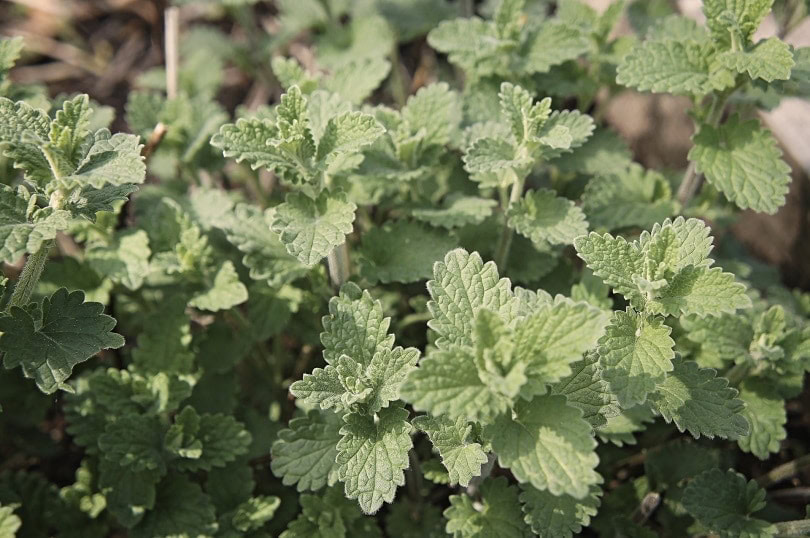
Is There Such a Thing as Too Much Catnip for a Kitten?
When it comes to catnip, there can indeed be too much of a good thing. While most cats and their pet parents find it great fun as an occasional treat, too much catnip or using it too often can be problematic. Not only can it be overstimulating, but too much of the plant, be it fresh or dried, can also cause vomiting and diarrhea if eaten in excessive amounts.
Although these are hard to verify objectively, there have also been occasional reports of pet parents feeling like their cat ended up with personality changes after using catnip repeatedly and frequently. Perhaps, as with most things, common sense would suggest that “easy does it” and that it is likely best to use catnip sparingly and occasionally.


Conclusion
Catnip can be a safe recreational plant and a fun way for pet parents to enhance play, well-being, and bonding with their kittens if they respond to it positively. However, although catnip isn’t toxic per se, pet parents should be mindful not to overdo it. By limiting the amount of catnip used and the frequency, they can ensure that catnip stays a fun, safe, and entertaining treat for their little feline friend.
Featured Image Credit: Lightspruch, Shutterstock
